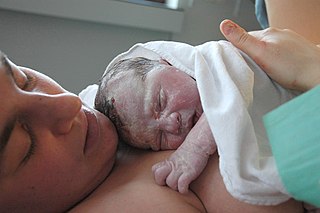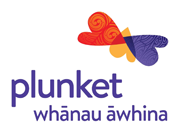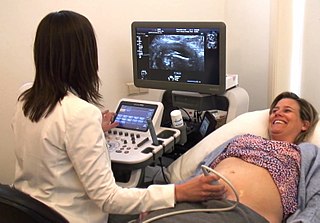Related Research Articles

Midwifery is the health science and health profession that deals with pregnancy, childbirth, and the postpartum period, in addition to the sexual and reproductive health of women throughout their lives. In many countries, midwifery is a medical profession. A professional in midwifery is known as a midwife.

Childbirth, also known as labour, parturition and delivery, is the completion of pregnancy where one or more babies exits the internal environment of the mother via vaginal delivery or caesarean section. In 2019, there were about 140.11 million human births globally. In the developed countries, most deliveries occur in hospitals, while in the developing countries most are home births.
Child abandonment is the practice of relinquishing interests and claims over one's offspring in an illegal way, with the intent of never resuming or reasserting guardianship. The phrase is typically used to describe the physical abandonment of a child, but it can also include severe cases of neglect and emotional abandonment, such as when parents fail to provide financial and emotional support for children over an extended period of time. An abandoned child is referred to as a foundling. Baby dumping refers to parents leaving a child younger than 12 months in a public or private place with the intent of terminating their care for the child. It is also known as rehoming when adoptive parents use illegal means, such as the internet, to find new homes for their children. In the case where child abandonment is anonymous within the first 12 months, it may be referred to as secret child abandonment.
A birthing center is a healthcare facility, staffed by nurse midwives, midwives and/or obstetricians, for mothers in labor, who may be assisted by doulas and coaches. The midwives monitor the labor, and well-being of the mother and the baby during birth. Doulas can assist the midwives and make the birth easier. Should additional medical assistance be required, the mother can be transferred to a hospital. This transfer is more likely if an epidural is needed, there is meconium staining, it is a prolonged labor, or the newborn needs intensive care. Some hospitals have birth centers as an alternative to the usual high tech maternity wards.

A nanny is a person who provides child care. Typically, this care is given within the children's family setting. Throughout history, nannies were usually servants in large households and reported directly to the lady of the house. Today, modern nannies, like other domestic workers, may live in or out of the house, depending on their circumstances and those of their employers. Some employment agencies specialize in providing nannies, as there are families that specifically seek them and may make them a part of the household.

The postpartum period begins after childbirth and is typically considered to end within six weeks. However, there are three distinct but continuous phases of the postnatal period; the acute phase, lasting for six to twelve hours after birth; the subacute phase, lasting six weeks; and the delayed phase, lasting up to six months. During the delayed phase, some changes to the genitourinary system take much longer to resolve and may result in conditions such as urinary incontinence. The World Health Organization (WHO) describes the postnatal period as the most critical and yet the most neglected phase in the lives of mothers and babies; most maternal and newborn deaths occur during this period.

A nursing home is a facility for the residential care of older people, senior citizens, or disabled people. Nursing homes may also be referred to as care homes, skilled nursing facilities (SNF) or long-term care facilities. Often, these terms have slightly different meanings to indicate whether the institutions are public or private, and whether they provide mostly assisted living, or nursing care and emergency medical care. Nursing homes are used by people who do not need to be in a hospital, but cannot be cared for at home. The nursing home facility nurses have the responsibilities of caring for the patients' medical needs and also the responsibility of being in charge of other employees, depending on their ranks. Most nursing homes have nursing aides and skilled nurses on hand 24 hours a day.

Kangaroo Mother Care (KMC), which involves skin-to-skin contact (SSC), is an intervention to care for premature or low birth weight infants (LBW). The technique and intervention is the recommended evidence-based care for low birth weight infants by the World Health Organization (WHO) since 2003.

A neonatal intensive care unit (NICU), also known as an intensive care nursery (ICN), is an intensive care unit (ICU) specializing in the care of ill or premature newborn infants. The NICU is divided into several areas, including a critical care area for babies who require close monitoring and intervention, an intermediate care area for infants who are stable but still require specialized care, and a step down unit where babies who are ready to leave the hospital can receive additional care before being discharged.
Fetal viability is the ability of a human fetus to survive outside the uterus. Medical viability is generally considered to be between 23 and 24 weeks gestational age. Viability depends upon factors such as birth weight, gestational age, and the availability of advanced medical care. In low-income countries, half of newborns born at or below 32 weeks gestational age died due to a lack of medical access; in high-income countries, the vast majority of newborns born above 24 weeks gestational age survive.

The Royal New Zealand Plunket Trust provides a range of free services aimed at improving the development, health and wellbeing of children under the age of five within New Zealand, where it is commonly known simply as Plunket. Its mission is "to ensure that New Zealand children are among the healthiest in the world". Much of Plunket's work is organised by volunteer bases throughout New Zealand.

Unassisted childbirth (UC) refers to the process of intentionally giving birth without the assistance of a medical birth attendant. It may also be known as freebirth, DIY (do-it-yourself) birth, unhindered birth, and unassisted home birth. Unassisted childbirth is by definition a planned process, and is thus distinct from unassisted birth due to reasons of emergency, lack of access to a skilled birth attendant, or other. It is also different from homebirth, although most UCs also happen within the home.
A surgical nurse, also referred to as a theatre nurse or scrub nurse, specializes in perioperative care, providing care to patients before, during and after surgery. To become a theatre nurse, Registered Nurses or Enrolled Nurses must complete extra training. Theatre nurses can focus on different speciality areas, depending on which they are interested in.

Neonatal nursing is a sub-specialty of nursing care for newborn infants up to 28 days after birth. The term neonatal comes from neo, "new", and natal, "pertaining to birth or origin". Neonatal nursing requires a high degree of skill, dedication and emotional strength as they care for newborn infants with a range of problems. These problems vary between prematurity, birth defects, infection, cardiac malformations and surgical issues. Neonatal nurses are a vital part of the neonatal care team and are required to know basic newborn resuscitation, be able to control the newborn's temperature and know how to initiate cardiopulmonary and pulse oximetry monitoring. Most neonatal nurses care for infants from the time of birth until they are discharged from the hospital.

Dr. Jose Fabella Memorial Hospital, the National Maternity Hospital, is a maternal and newborn tertiary hospital located in Santa Cruz, Manila in the Philippines. It also houses the Jose Fabella Memorial Hospital School of Midwifery, one of the best performing institutions recognized by the Professional Regulation Commission in the Midwife Licensure Examinations. In 2015, the World Health Organization recognized the hospital "as a role model of the World Health Organization-Western Pacific Region Office for its essential newborn care programs, which have been proven to reduce infant morbidity and mortality".
Nsambya Home Care (NHC) is one of the departments of Nsambya Hospital, a faith-based hospital in Uganda. The department offers medical and psychosocial support to people living with HIV/AIDS (PLWHAs). Established in 1987 by Miriam Duggan, it is a department of St. Francis Hospital Nsambya. Since its founding, NHC has provided care and treatment services to over 15,000 clients. With support from the AIDS Relief program and in collaboration with Catholic Relief Services, the program started providing antiretroviral medications in 2004 and so far close to 2000 active patients are benefiting from treatment. It is headquartered in Nsambya, a section of Kampala, Uganda. A field office of the program is located at Ggaba, a southern suburb of Kampala. NHC is led by Maria Nannyonga Musoke, a consultant paediatrician of Nsambya Hospital.

A midwife is a health professional who cares for mothers and newborns around childbirth, a specialization known as midwifery.
This article provides a background on Nepal as a whole, with a focus on the nation's childbearing and birthing practices. While modern Western medicine has disseminated across the country to varying degrees, different regions in Nepal continue to practice obstetric and newborn care according to traditional beliefs, attitudes, and customs.
Postpartum care or postnatal care is a service provided to individuals in the postpartum period, to help with postpartum recuperation and restoration.
Newborn care and safety are activities and precautions recommended for new parents or caregivers. It is an educational goal of many hospitals and birthing centers to promote newborn care and safety as parents take their infant home.
References
- ↑ Expat Arrivals, Having a Baby in the Netherlands, Sept 2010
- ↑ "Postnatale zorg, kraamzorg en kraamhulp bij je thuis na je bevalling". www.solidariteit.be. Retrieved 31 December 2018.
- ↑ "A new approach to post-natal care: Mothers' helpers". Independent. 26 November 2013. Retrieved 7 November 2016.